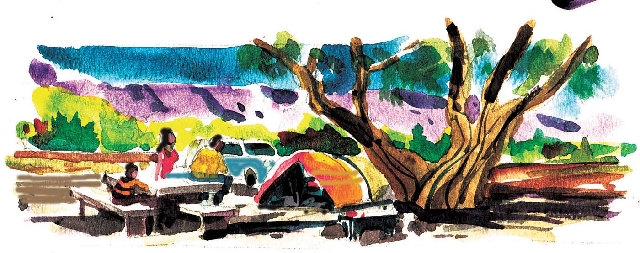Outdoor adventures await at Mojave National Preserve

Springtime retreats into the hills and rugged mountains this month in the Mojave National Preserve south of Las Vegas near the Nevada-California border.
A few determined roadside flowers are still in bloom, but most spring blossoms now will be found above 3,000 feet, mostly on yuccas and various cactuses. The desert’s extreme summer heat forces many plants into dormancy. After late summer rains, the pace of life picks up again in the preserve.
Encompassing 1.6 million acres of desert and mountains, the Mojave National Preserve lies within easy reach for Southern Nevadans seeking outdoor adventures and scenery. Popular activities include picnicking, camping, hiking, scenic touring, horseback trail riding and off-pavement exploration of old roads and historic trails.
Accessed by several approaches from Interstate 15 or U.S. Highway 95, the preserve remains open year-round with no entrance fees. To reach the preserve by one of the shortest routes, drive south on I-15 through Primm and turn off at the Nipton-Searchlight cutoff, state Route 164. Watch for Ivanpah Road and turn there. Drive a short distance to Morningstar Mine Road, which leads to a crossroad at Cima. Follow signs south toward Kelso, an old railroad stop. The road travels through the world’s largest forest of Joshua trees. Between Cima and Kelso, you’ll pass Cedar Canyon Road, a gravel route into the preserve’s interior. You can backtrack to this road after visiting the preserve’s principal information center in the historic Kelso Depot.
The two-story, mission-style depot, built in the 1920s, includes an information desk with maps and brochures, a book and gift store, walk-through exhibits on the main floor, refurbished rooms upstairs and a basement art gallery. The main lobby features The Beanery, a railroad eatery. Because of federal cutbacks, the depot is closed on Wednesdays and Thursdays. It is open five days a week from 9 a.m. to 5 p.m. Check at the desk for ranger programs and hikes scheduled on weekends. The Kelso Dunes rise to crests several hundred feet high a few miles south of the depot.
Return to Cedar Canyon Road to climb from the Union Pacific tracks into the higher elevations through a twisting canyon. Subject to flash floods, the road may be rough in places but is usually passable for passenger vehicles. About 2½ miles from the tracks, pull over to admire the view behind you. The elevation gain provides a good look at a major landmark, the Cima Dome, a symmetrical 1,500-foot rise in the desert.
A couple of miles before reaching Black Canyon Road, the route passes one of two developed campgrounds in the Mojave National Preserve. A dirt side road leads to Mid-Hills Campground, which has 26 campsites amid pinyons and junipers at about 5,600 feet elevation.
Because it is cooler at this elevation, Mid-Hills is busy in the summertime. Campsites in the preserve are available on a first-come basis with a fee of $12, or $6 with a federal recreation pass.
Beyond Black Canyon Road, the Cedar Canyon route connects with other roads exploring the interior of the preserve, including historic forts along a frontier wagon route, springs, hiking trails and other points of interest.
Follow Black Canyon Road south to reach Hole-in-the-Wall, an eroded rhyolite formation with holes, spires and grottos. An information station there is open Wednesdays through Sundays from 9 a.m. to 4 p.m. Other facilities include a campground with 37 sites, an equestrian camp, a group and trail heads. One trail from there leads to Banshee Canyon and a popular hiking and horse route that runs several miles north to Mid-Hills.
Since no services are available within the preserve, always start your visit with a full gas tank. Carry a good spare tire and the tools to change a flat. Bring water for the car and at least a gallon of drinking water per person. Take a detailed map of the area. Tell a responsible person at home where you are headed and when you expect to return.
Margo Bartlett Pesek’s Trip of the Week column appears on Sundays.